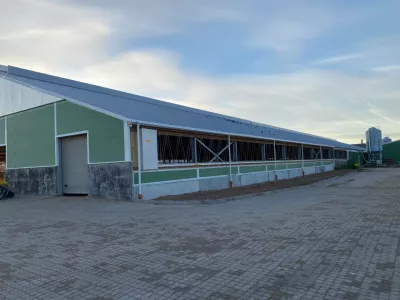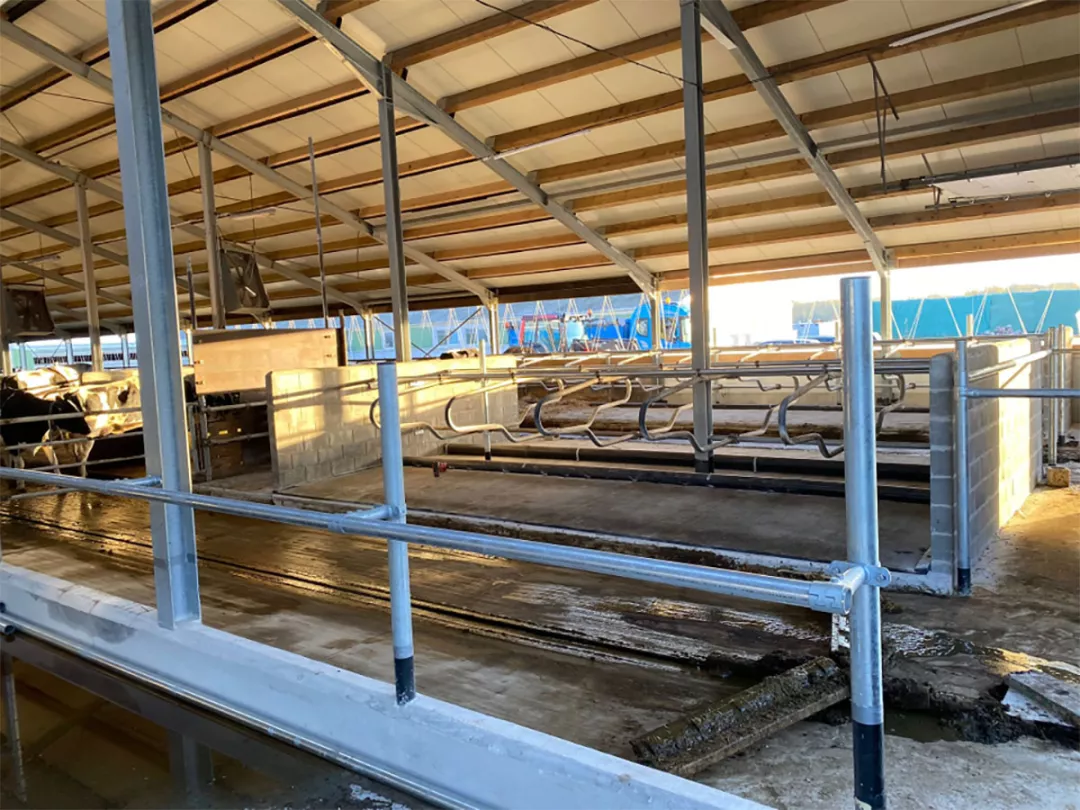General information
RDP Priority
- P2. Competitiveness
RDP Focus Area
- 2A: Farm’s performance, restructuring & modernisation
RDP Measure
- M04: Investments in physical assets
Beneficiary type
- Farmer / land manager
Summary
A CAP-funded investment in a dairy farm in the Zemgale plain of Latvia resulted in a 10% increase in milk yield and reduced manual labour. The investment project also maintained the farm's reputation for high animal welfare standards. Project actions involved replacing an old milking carousel with automated robots and expanding the dairy shed to accommodate over 400 animals.
Results
- This farm modernisation project led to a 10% increase in milk yield, enhancing overall competitiveness.
- Manual workload was reduced for three full-time positions due to automation.
- Associated savings allowed for increased salaries and further investment.
- The upgraded facilities also provided more opportunities for monitoring and managing the livestock’s health and welfare.

Promoter
ZS Rudeņi
Funding
Total budget: 2 500 000 (EUR)
EAFRD: 589 553 (EUR)
National/Regional: 277 437 (EUR)
Private/own: 1 633 010 (EUR)
Ressources
Documents
Good Practice Report - Dairy farm ZS Rudeņi production modernisation
(PDF – 972.76 Ko)
Context
Founded in 1999, Rudeņi farm is located in the southern part of Latvia's Zemgale plain and specialises in dairy and grain farming. Mr Toms Knope, who inherited the farm from his parents, undertook a gradual takeover approach, one sector at a time, ensuring a smooth transition of responsibilities. This methodical transfer and the foundational principles of hard work, long-term thinking, and a heart-driven approach have established Rudeņi as one of Latvia's exemplary farms. Known for its high animal welfare and sustainability standards, the farm serves as an educational model for young and seasoned farmers.
With a workforce of approximately 29 employees, Rudeņi maintains year-round employment, minimising the need for seasonal labour. The farm manages a diverse range of crops across 700 hectares (ha), including rapeseed (140 ha), wheat (160 ha), winter and summer barley (both 80 ha), corn (80 ha), and grassland (160 ha). The dairy operation boasts a herd of 370 milking heifers and 340 breeding heifers. This farm also ensures places of residence for the workers if in need. It has spacious, comfortable mechanical workshops and interesting and innovative solutions for different processes and buildings. Earlier EU-funded investments through the pre-accession agricultural instrument (SAPARD) and the European Agricultural Fund for Rural Development (EAFRD) helped construct cattle sheds, buy agricultural machinery and improve facilities.
Objectives
This investment project aimed to modernise the farm’s milking and welfare processes, maintaining high-quality standards and ensuring the well-being of both staff and animals.
By upgrading facilities and implementing automation, Rudeņi sought to maintain its reputation for excellent animal comfort while enhancing efficiency and productivity.
Activities
Installation of milking robots - The project replaced a traditional milking carousel with advanced milking robots, automating the milking process and reducing manual labour requirements.
Expansion of the shed - The dairy shed was extended by 50 metres, resulting in a total length of 124 metres. This expansion created space for more than 400 animals, approximately 100 more than the previous capacity.
Main results
- This modernisation led to a 10% increase in milk yield, enhancing overall production profitability, although influenced by market prices.
- The workload was reduced by three full-time positions due to automation.
- The upgraded facilities provided more opportunities for monitoring and managing the herd, improving overall animal health and welfare.
- Improved livestock health and increased number of milking cows.
- The farm remained a model for animal welfare, despite the challenges posed by construction.
Key lessons
- The project highlighted the importance of financial reserves to weather unexpected challenges, such as geopolitical events like the Ukraine war, which severely impacted milk production profitability. The situation underscored the value of multi-sector operations for resilience.
- Unforeseen cost increases and lengthy procurement processes can pose challenges, emphasising the need for improved trust and collaboration between policymakers, farmers and other stakeholders to achieve sustainable food production goals.
- Generational renewal involved a gradual, step-by-step approach involving taking responsibility for one part of the farm business after another - not all at once.
As the farm operates in several sectors - grain farming, livestock farming and provision of agricultural services, we have implemented environmentally friendly management in our daily work both in each of the mentioned sectors separately and in their interaction. We work in the countryside of Zemgale, which is called ‘the bread region’ due to the productive soils, therefore we are aware that our wealth and resource is the land. It must be managed in an environmentally friendly way so that it maintains its productivity in the long term. We want to convey this sustainability message to young people as well.
